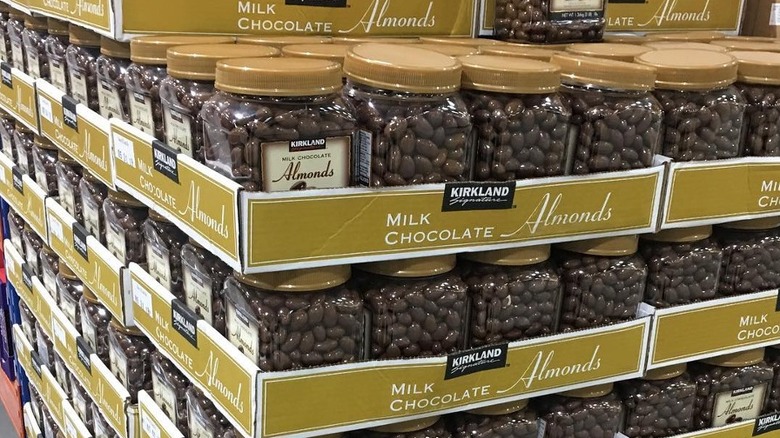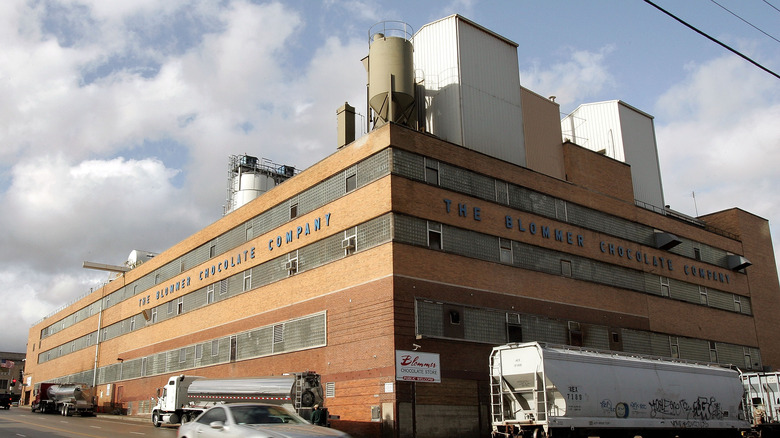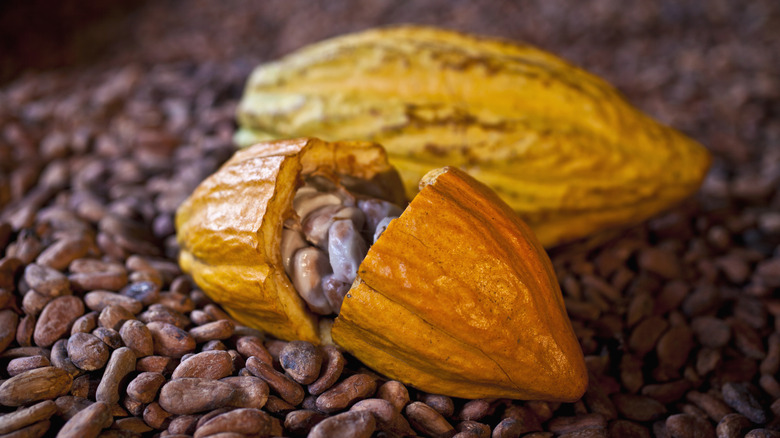There's A Massive Brand Behind Costco's Chocolate-Covered Almonds
Costco's chocolate-covered almonds are hailed as a beloved treat, making it impossible to avoid snacking on them throughout the day. Though most people know the chain's trademark chocolatey nuts are part of its successful in-house Kirkland label (which followed several failed attempts), there's another company involved in their production. Blommer Chocolate Company is the largest chocolate manufacturer in North America, and it's mainly thanks to this Chicago-based brand that Costco customers can stock up on Kirkland's roasted almonds covered in milk chocolate.
Though Blommer operates on a mammoth scale, Costco shoppers probably aren't familiar with the corporation. This could be the result of the Windy City chocolate company's tendency to keep quiet about its clients, as reported by the Chicago Tribune. Started by the Blommer brothers — Henry Sr. and his enterprising siblings Al and Bernard — in 1939, the cocoa bean processor produces an incredible array of confectionary creations — from powders and syrups to dark, light, and white chocolate for all kinds of applications, including baking, candy coatings, and ice cream toppings. In May 2024, Blommer shuttered its original Chicago manufacturing plant (via the Chicago Sun-Times). While the scent of chocolate wafting through the air from the factory is surely missed, the company remains headquartered in the city.
Costco's Kirkland Signature chocolate-covered almonds may be just one of countless items that Blommer makes, but neither brand seems to treat the joint effort as an afterthought. In fact, the two companies have worked to address problems in the chocolate industry.
Blommer's rise to the top
The saying "Rome wasn't built in a day" certainly applies to Blommer Chocolate Company, which has grown larger and larger since its nearly 100 years in operation. When the Blommer brothers founded the chocolate business together, they likely didn't anticipate the scale Blommer Chocolate Company would one day reach. As Henry Sr. rose to take on the roles of CEO and Chairman, he would watch his company become one of the biggest chocolate producers in the world.
In fact, by 1997, Blommer was processing 5% of the world's cacao beans. If that's not impressive enough, as of 2014, that figure had jumped to 45%, according to the Chicago Tribune.
After nearly 80 years of operating as a family business, Blommer was acquired by Japanese company Fuji Oil group for $750 million. The two companies have announced major initiatives to combat child labor in the cacao supply chain by 2025. However, Blommer's commitment to supporting humanitarian practices within the cacao industry is not a recent development.
Making the chocolate industry more sustainable
Blommer has been trying to improve the sustainability of the cacao industry, and these efforts can be seen in the company's partnership with Costco. As outlined in a 2013 issue of Costco Connections magazine, the two companies work with farming communities and cacao-farming cooperatives across The Ivory Coast, which, according to the Bulgarian Journal of Agricultural Science, is the world's largest exporter of cacao and produces the most cocoa in the world. In fact, according to the International Institute for Sustainable Development, The Ivory Coast exported a staggering $4 or so billion worth of cacao beans in 2016.
The main goals of this initiative are to maintain a high quality of cacao, like the kind found in Kirkland Signature chocolate-covered almonds, as well as to make sure cacao beans can be traced back to where they were grown. Fair return and transparency with farmers are also objectives of the partnership. Whether on a global or local scale, Costco is trying to make improvements.
According to a 2011 statement released by Blommer, the need for this partnership became clear due to challenges to the cacao supply chain. These challenges include a lack of infrastructure and low income levels for cacao farmers.
In keeping with Blommer's findings, The Economist Intelligence Unit predicted a long-term cacao supply shortage due to low wages, which discourage young people from becoming cacao farmers. Initiatives like the one between Costco and Blommer could help create a better future for the cacao industry.


